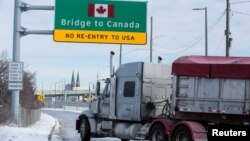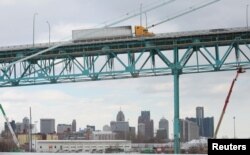As Canadian authorities work to end trucker protests that have snarled traffic and commerce, it remains unclear whether copycat demonstrations decrying COVID-19 pandemic restrictions and mandates will materialize in the United States.
Since the "trucker" protests began in Canada several weeks ago, attempts to emulate them have sprung up in other countries, though none have caused anything close to the disruption in Canada and in some U.S. cities along the two countries' vast common border.
Over the weekend, officials of the Canadian province of Ontario cleared away protesters who had been blocking the Ambassador Bridge for a week. The bridge, which connects Windsor, Ontario, with Detroit, Michigan, is the largest conduit of trade between the U.S. and Canada, which are each other's largest trading partners.
Canadian officials, however, have been slower to act against the demonstrators, who have brought the nation's capital, Ottawa, to a standstill for several weeks.
Protest roots expanded
The demonstrations in Canada began as a protest against the requirement that truck drivers who drive their rigs across the U.S.-Canada border be vaccinated against the coronavirus.
In the weeks since they began, however, the protests have grown to include many people who are not truck drivers. And their cause has expanded to include a host of pandemic-related requirements that the demonstrators want removed, such as masking rules and restricted access to public spaces for the unvaccinated.
The protests have also attracted individuals espousing racist views, QAnon believers, and people supporting conspiracy theories about the origins of COVID-19 and the supposed dangers of 5G wireless networks.
Republicans show support
In the United States, several conservative politicians, including some high-profile Republican members of Congress, have expressed support for the Canadian trucker protests, with some suggesting that they would welcome similar protests aimed at shutting down U.S. cities.
"God bless these Canadian truck drivers," Texas Senator Ted Cruz tweeted. "They're defending Canada, America, and they're standing up for freedom! The government doesn't have the right to force you to comply to their arbitrary mandates."
Lance Gooden, a representative from Texas, told Fox News, "I would absolutely welcome a similar pronouncement of protest in our nation's capital by truckers and anyone who wants their freedoms back. People are fed up with these overbearing, overburdening regulations that are not based in science."
Kentucky Senator Rand Paul was asked by the conservative outlet The Daily Signal about the possibility of protests in the U.S. generally, and one focused on Sunday's Super Bowl in Los Angeles, in particular.
"I'm all for it," Paul said. "Civil disobedience is a time-honored tradition in our country, from slavery to civil rights to you name it. Peaceful protest, clog things up, make people think about the mandates."
U.S. protests a no-show
Despite some efforts to organize a U.S.-based trucker protest, nothing has emerged so far. An effort to block traffic during the Super Bowl, which was held in Los Angeles on Sunday, failed to materialize.
On Facebook, multiple groups have claimed to be organizing U.S. protests. Some appear to have been created by individuals outside the U.S. who are using them to generate internet traffic to unrelated sites or to sell merchandise to would-be protesters.
One group, called Freedom Convoy U.S., posted a detailed itinerary for a convoy traveling from Tennessee to Buffalo, N.Y., a city on the Canadian border. Over the weekend, an angry commenter complained that he had been among a group of supporters who had stood out in the cold waiting for the convoy to make a scheduled stop in Pennsylvania but that no trucks had arrived.
Some groups do appear, however, to be coalescing around the idea of a convoy that would leave from different parts of the United States in the first week of March and eventually converge on Washington. Whether they will be successful remains to be seen.
Fundraising controversy
In the early days of the demonstrations, Canadian protesters began soliciting financial support on the crowdfunding website GoFundMe. But earlier this month, the website announced it that was suspending the fundraising effort and would be refunding all donations in support of the convoys.
"The previously peaceful demonstration has become an occupation, with police reports of violence and other unlawful activity," the company said.
In the U.S., Republican attorneys general in Texas and Missouri announced that they would open investigations into the company's decision to block donations to the convoy.
Meanwhile, the Canadian convoy's organizers turned to GiveSendGo, which bills itself as a "Free Christian Crowdfunding Site." On Monday, a hacker affiliated with the group Anonymous announced that he had broken into the GiveSendGo website and released more than 90,000 names of people who, he claimed, had donated more than $9 million to the cause.
On Monday afternoon, the GiveSendGo website was offline.







